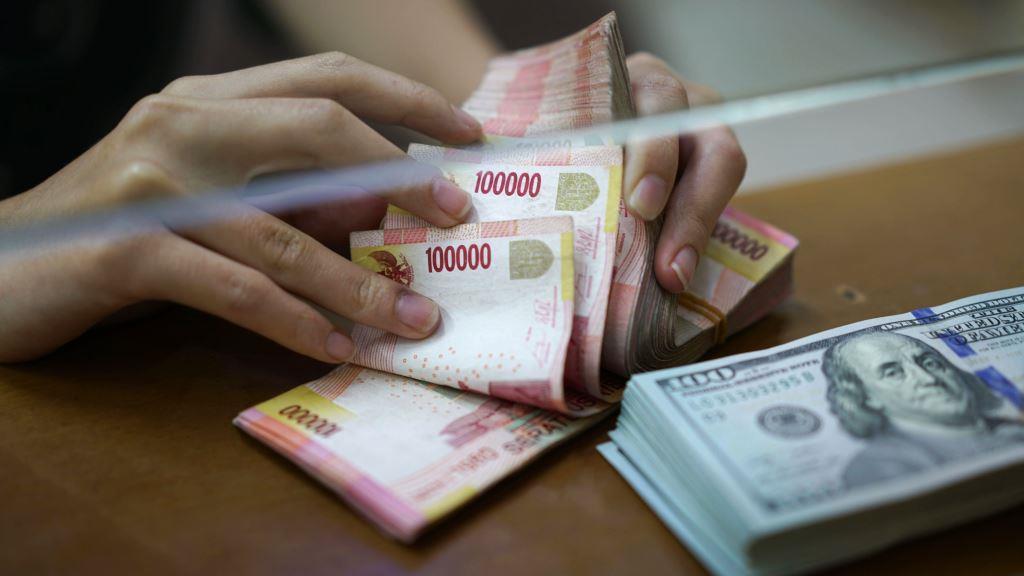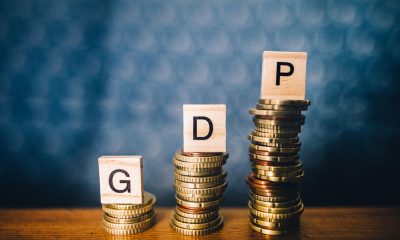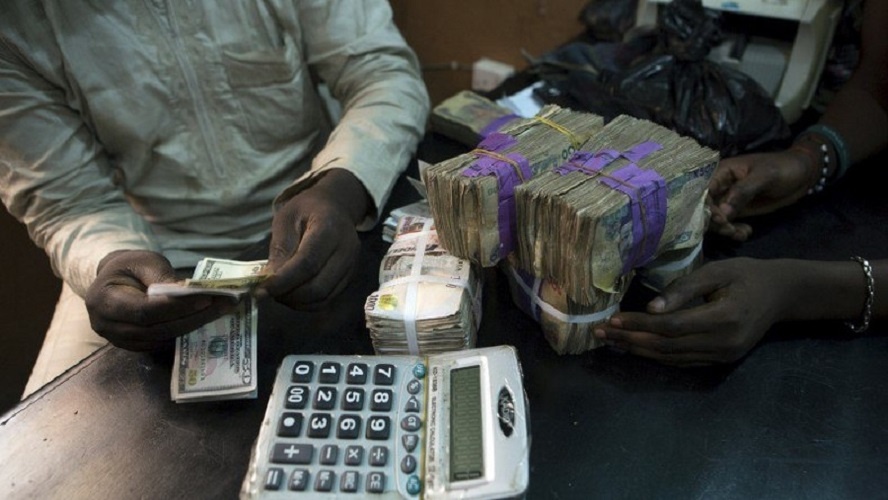Economy
Nigeria’s GDP Grows by 3.11% in Q1, What Next?

By Lukman Otunuga
There are two ways one could interpret Nigeria’s latest Gross Domestic Product (GDP) figure of 3.11% in Q1 of 2022.
The optimists will say the country’s economy grew for the sixth consecutive quarter in Q1 while pessimists may highlight how economic growth slowed for the third consecutive quarter.
Either way, Nigeria’s economy continues to display resilience against external and domestic risks. With the improvement in the non-oil sector driving growth, this may brighten the growth outlook. But could these be signs of Nigeria breaking away from the chains of oil reliance to derive growth from sustainable sources? It may be too early to come to any meaningful conclusion. However, the report is encouraging and illustrates progress made by the country in reclaiming stability post-Covid-19.
With economic conditions somewhat improving, the Central Bank of Nigeria (CBN) is unlikely to raise interest rates this week. Given how Africa’s largest economy has been able to maintain growth in the past six quarters on the back of loose monetary policies by the CBN, a rate hike could disrupt Nigeria’s economic recovery.
As the global war against inflation rages on, central banks are stepping up.
However, the CBN is likely to remain on the sidelines for now. Nevertheless, inflation is still a cause for concern with consumer prices accelerating for the third straight month to 16.82% in April 2022.
With the general elections around the corner, pre-election spending could translate to rising price pressures. On top of this, the widening policy divergence between the Federal Reserve and the CBN could punish the Naira.
It’s worth keeping in mind that the dollar remains heavily supported by aggressive Fed rate hike bets and is likely to remain strong for the rest of 2022. A powerful dollar is bad news for emerging market currencies including the Naira which continues to depreciate in both the official and unofficial markets.
Lukman Otunuga is the Senior Research Analyst at FXTM
Economy
Naira Further Crashes to N1,349/$1 at Official Market

By Adedapo Adesanya
The first trading day in the currency market in Nigeria ended bearish for the Naira as its value further weakened against the US Dollar in the Nigerian Autonomous Foreign Exchange Market (NAFEX) on Monday by N2.92 or 0.22 per cent to N1,349.24/$1 from the N1,346.32/$1 it was traded last Friday.
Also in the spot market, the Nigerian currency depreciated against the Pound Sterling by N6.62 during the trading day to close at N1,821.87/£1 versus the preceding session’s N1,815.25/£1, and lost N6.80 on the Euro to settle at N1,591.42/€1, in contrast to the previous rate of N1,584.62/€1.
At the GTBank forex desk, the Nigerian Naira crashed against the greenback yesterday by N1 to quote at N1,357/$1 versus the preceding session’s closing value of N1,356/$1, but in the black market, the Naira appreciated by N5 to close at N1,365/$1 compared with the preceding trading day’s N1,370/$1.
The Naira slide came amid renewed pressure as weekly inflows declined, as Bureaux De Change (BDC) operators were unable to purchase Dollars from banks two weeks after the Central Bank of Nigeria (CBN) reopened the official FX Market window to them.
It had been expected that BDCs would help to further deflate the parallel market premium, but according to reports, BDC operators had yet to commence FX purchases from commercial banks, two weeks after the apex bank said legitimate agents can access up to $150,000 from the banks.
There were no FX inflows from the CBN during the past week, according to a report by the research department of Coronation Merchant Bank.
Meanwhile, Nigeria’s external reserves, which provide the CBN with firepower to support the naira, rose to $48.77 billion as of February 19, 2026.
Meanwhile, the cryptocurrency market was in the red as a broader risk-off shift tied to an emerging “AI scare trade” in equities is weighing on crypto markets.
This is leading traders to sell, while the sharp liquidation events that typically attract dip buyers have seen no such move recently, with Bitcoin (BTC) down by 3.2 per cent to $62,901.86.
Further, Ethereum (ETH) depreciated by 2.5 per cent to $1,821.13, Cardano (ADA) slid 1.9 per cent to $0.2571, Litecoin (LTC) went down by 1.9 per cent to $50.45, Solana (SOL) shrank 1.8 per cent to $76.54, Dogecoin (DOGE) declined by 1.7 per cent to $0.0912, Ripple (XRP) slumped 1.2 per cent to $1.32, and Binance Coin (BNB) lost 0.6 per cent to sell for $589.88, while the US Dollar Tether (USDT) and the US Dollar Coin (USDC) closed flat at $1.00 each.
Economy
Crude Oil Slips Ahead Third Round of US–Iran Nuclear Talks

By Adedapo Adesanya
Crude oil eased on Monday ahead of a third round of nuclear talks between the US and Iran, and amid increased economic uncertainty after the latest US tariff upheaval.
According to data, Brent crude futures lost 27 cents or 0.38 per cent to close at $71.49 a barrel, while US West Texas Intermediate (WTI) crude futures fell 17 cents or 0.26 per cent to per barrel $66.31.
Iran has indicated its preparedness to make concessions on its nuclear programme in return for sanctions lifting and recognition of its right to enrich uranium.
The Iranian government, facing pressure at home with a growing opposition and globally with threats of a US military strike, appears ready for a third round of Omani-mediated talks with American negotiators this week.
According to reports, the Foreign Minister of Oman, Mr Badr Albusaidi, on Sunday said talks would resume on Thursday, February 26, in Geneva “with a positive push to go the extra mile toward finalising the deal” over Iran’s nuclear program.
In separate remarks, the Iranian government suggested talks in the Swiss city on that date. However, there has been no confirmation from the US officials.
The US administration has been pressuring Iran to agree to curtail its nuclear program, which Iran insists is intended for peaceful, civilian purposes, such as electricity generation. The US, along with Israel and others in the West, has accused Iran of intending to build atomic weapons.
US President Donald Trump has dispatched two aircraft carrier strike groups, with dozens of fighter jets and bombers to the region, and other military planes and supporting forces have been spotted flying into air bases in the Middle East.
President Trump said on Saturday that he would raise a temporary tariff from 10 per cent to 15 per cent on US imports from all countries, the maximum allowed under the law.
This came after a US Supreme Court ruling last week struck down key parts of President Trump’s tariff plans, rekindling uncertainty among investors and businesses.
Goldman Sachs lifted its Q4 2026 Brent forecast to $60 and WTI to $56 per barrel, citing lower-than-expected OECD stock levels.
The bank still projects a 2.3 million barrels per day surplus in 2026, assuming no major supply disruptions.
Meanwhile, the Organisation of the Petroleum Exporting Countries and its allies (OPEC+) may resume production increases in 2026 amid limited inventory builds and shifting market dynamics.
Economy
NGX RegCo Cautions Investors on Recent Price Movements

By Aduragbemi Omiyale
The investing public has been advised to exercise due diligence before trading stocks on the Nigerian Exchange (NGX) Limited.
This caution was given by the NGX Regulation Limited (NGX RegCo), the independent regulatory arm of the NGX Group Plc.
The advisory became necessary in response to notable price movements observed in the shares of certain listed companies over recent trading sessions.
On Monday, the bourse suspended trading in the shares of newly-listed Zichis Agro-allied Industries Plc. The company’s stocks gained almost 900 per cent within a month of its listing on Customs Street.
In a statement today, NGX RegCo urged investors to avoid speculative trading based on unverified information and to consult licensed intermediaries such as stockbrokers or investment advisers when needed.
It explained that its advisory is part of its standard market surveillance functions, as it serves as a measured reminder for investors to prioritise informed and disciplined decision-making.
The notice emphasised that the Exchange will continue to monitor market activities closely in line with its mandate to ensure a fair, orderly, and transparent market.
“NGX RegCo encourages all investors to base their decisions on publicly available information, including a thorough assessment of company fundamentals, financial performance, and risk profile,” a part of the disclosure said.
It reassured all stakeholders that the NGX remains stable, well-regulated, and resilient, saying the platform continues to foster an environment where investors can participate with confidence, supported by robust oversight and transparent market operations.
“Our primary responsibility is to maintain a level playing field where market participants can trade with confidence, backed by timely and accurate information.
“This advisory is a routine communication, reinforcing that sound fundamentals, not speculation, remain the foundation for sustainable investment outcomes. We are fully committed to preserving the integrity and stability of our market,” the chief executive of NGX RegCo, Mr Olufemi Shobanjo, stated.
-

 Feature/OPED6 years ago
Feature/OPED6 years agoDavos was Different this year
-
Travel/Tourism10 years ago
Lagos Seals Western Lodge Hotel In Ikorodu
-

 Showbiz3 years ago
Showbiz3 years agoEstranged Lover Releases Videos of Empress Njamah Bathing
-

 Banking8 years ago
Banking8 years agoSort Codes of GTBank Branches in Nigeria
-

 Economy3 years ago
Economy3 years agoSubsidy Removal: CNG at N130 Per Litre Cheaper Than Petrol—IPMAN
-

 Banking3 years ago
Banking3 years agoSort Codes of UBA Branches in Nigeria
-

 Banking3 years ago
Banking3 years agoFirst Bank Announces Planned Downtime
-

 Sports3 years ago
Sports3 years agoHighest Paid Nigerian Footballer – How Much Do Nigerian Footballers Earn




















